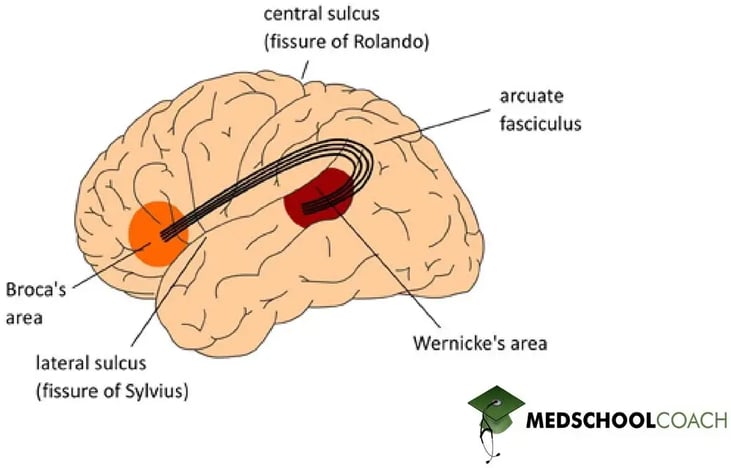Sample MCAT Question - Brain Areas That Control Speech
Which region of the brain is responsible for language production?
a) Broca’s Area
b) Wernicke’s Area
c) Arcuate Fasciculus
d) Auditory Cortex
Get 1-on-1 MCAT Tutoring From a Specialist
With MCAT tutoring from MedSchoolCoach, we are committed to help you prepare, excel, and optimize your ideal score on the MCAT exam.
For each student we work with, we learn about their learning style, content knowledge, and goals. We match them with the most suitable tutor and conduct online sessions that make them feel as if they are in the classroom. Each session is recorded, plus with access to whiteboard notes. We focus on high-yield topics if you're pressed for time. If you have more time or high-score goals, we meticulously cover the entire MCAT syllabus.
Brain Areas That Control Speech for the MCAT
The ability to speak and communicate through language is one of the most remarkable and defining features of human cognition. Behind this complex process lies a network of brain areas that work together to orchestrate the production and comprehension of speech. In this post, we'll be reviewing the speech control brain areas that you need to know for the MCAT, including Broca's area, Wernicke's area, and the arcuate fasciculus.
Broca's Area
Looking at Figure 1, we can see that Broca's area is a brain region in the frontal lobe of the left hemisphere of most individuals. Broca's area is important for language production, and individuals that have a damaged Broca's area have what is called nonfluent, expressive, or Broca's aphasia. People with Broca's aphasia are unable to produce language that is comprehensible. They often speak with poor sentence construction, disjointed words, and long pauses between words. However, these patients often don’t have any problems with language comprehension.
Wernicke's Area
Wernicke's area is a brain region in the temporal lobe of the left hemisphere of most individuals. Wernicke's area is important for language comprehension, and damage to this area can result in what is called fluent, sensory, or Wernicke's aphasia. Damage to Wernicke’s area results in difficulty comprehending language, but does not typically affect the ability to speak. However, because these patients cannot comprehend language, their speech is often nonsensical.
Arcuate Fasciculus
The arcuate fasciculus is a bundle of axons that connects Broca's area and Wernicke's area. Damage to the arcuate fasciculus results in what is called conduction aphasia. Patients with conduction aphasia can successfully comprehend and produce language. However, the patients typically have difficulty repeating words that they hear.

Explore More
MCAT Masterclass Chapters
Take a closer look at our entire MCAT Masterclass or explore our lessons below.
-
Weber's Law - MCAT Psychology
View Subject -
Structure of the Eye
View Subject -
Commonly Used Chemistry Metric Units
View Subject -
Ideal Gases vs Real Gases
View Subject -
Glycolysis Net Reaction
View Subject -
Language Development - MCAT Psychology
View Subject




